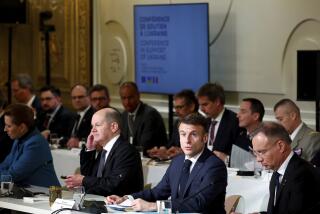Bush to Push Troop Pullout From Baltics : Military: He makes pledge to presidents of the three independent states.
- Share via
WASHINGTON — President Bush told the presidents of Estonia, Latvia and Lithuania on Tuesday that he will exert U.S. pressure on the fraying central government of the Soviet Union to remove thousands of Soviet troops from the newly independent Baltic republics.
“All three presidents did ask (Bush) for his support . . . in getting Soviet troops out of their countries,” White House Press Secretary Marlin Fitzwater said after a hastily scheduled meeting between Bush and Presidents Arnold F. Ruutel of Estonia, Anatolijs V. Gorbunovs of Latvia and Vytautas Z. Landsbergis of Lithuania. “The President said that he would use our influence wherever possible.”
Although Moscow already has granted the Baltic nations complete independence and co-sponsored their admission to the United Nations as sovereign nations, it now intends to leave its military forces in the three countries until 1994. Soviet President Mikhail S. Gorbachev is reluctant to remove the troops for now because Moscow lacks adequate barracks to house them.
Landsbergis, who spoke with reporters in the White House drive, said the 1994 schedule “is completely unacceptable to us.” Referring to the meeting with Bush, he added: “We talked about the withdrawal of the Soviet army from our territories. It’s the main question for us for the near future. And I can say that there was an understanding.”
The request from Estonia, Latvia and Lithuania put Bush back in the uncomfortable position of having to take sides between the central government in Moscow and the independence-minded republics that once constituted the Soviet Union. Bush angered some supporters of the Baltics by withholding U.S. diplomatic recognition until Gorbachev agreed not to contest the declarations of independence of the three.
U.S. officials say the Administration wants to avoid any action that would make it more difficult for Gorbachev to continue to exert central authority over the Soviet military establishment.
Although officials say Washington has no objection to increased autonomy or even sovereignty for the remaining 12 republics on domestic issues, the United States does not want to see the breakup of the Soviet military establishment because it could result in a loss of control over Moscow’s nuclear arsenal.
Nevertheless, there was no equivocation in the White House’s public endorsement of the Baltic desire to see the departure of the Soviet forces. Although officials in the Baltics previously had estimated that as many as 250,000 troops were on their soil, the U.S. government estimates that about 18,000 Soviet army and coastal defense troops remain in Lithuania, 5,000 in Latvia and 2,500 in Estonia. In addition, a combined total of about 5,000 Soviet navy, air force and air defense personnel are stationed in the three Baltic states.
More to Read
Sign up for Essential California
The most important California stories and recommendations in your inbox every morning.
You may occasionally receive promotional content from the Los Angeles Times.













